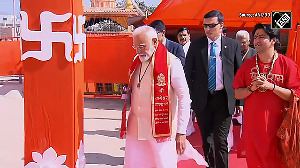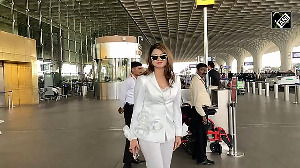Andhra Pradesh Chief Minister Y S Rajasekhar Reddy on Thursday asserted that the demand for a separate statehood for Telangana was a "complicated and serious" issue and it would take a bit longer for the Congress high command and the United Progressive Alliance government to take a decision.
Making a suo motu statement in the State legislative Assembly after Telangana Rashtra Samithi members were suspended for disrupting the proceedings, Reddy observed that the Telangana issue cannot be resolved overnight and appealed to the TRS and other parties to wait till a decision is taken in a democratic manner.
He even likened the Telangana issue to "the protracted dispute between India and Pakistan over the Kashmir issue."
Reddy pointed out that the Congress leaders had left the issue to the Congress high command to "take an appropriate decision at the appropriate time." He said that the TRS, too, had accepted the Congress high command as a "judge" in the case.
He advised the TRS members to have patience and not to precipitate matters "till the judge delivers the judgment after looking into all aspects of the issue."
Reddy said he was not standing in the way of a separate Telangana state. He was not taking sides as "advocate general" for an integrated Andhra Pradesh or against separate statehood for Telangana.
He admitted that due to the confusion prevailing on the Telangana issue, there was the likelihood of both the Congress and TRS becoming "weak."
He recalled that on the eve of the 2004 Assembly/Lok Sabha elections, the Congress and the TRS had entered into a poll alliance and leaders from both the parties were signatory to a statement spelling out their understanding on the issue.
A Narendra, the then working president of TRS, had appended his signature to the understanding that welcomed the second States Reorganisation Commission to go into the Telangana issue.
After the polls, the Congress came to power in the state and the Congress-led United Progressive Alliance gained power at the Centre.
The UPA included the issue of Telangana statehood in the common minimum programme and resolved to sort out the demand through consultations and consensus with other parties on the issue.
Subsequently, the UPA formed a sub-committee headed by Union Minister Pranab Mukherjee to consult various political parties to ascertain their opinion on the issue.
Several parties responded to the UPA panel. Some of them favoured a separate Telangana state while some others opposed the move. A few parties did not even communicate their views to the Mukherjee panel.
Reddy said that Muslim community leaders and political parties representing them had met Congress president Sonia Gandhi and also represented to the Mukherjee panel, stating that as stakeholders in the issue, they had some reservations about separate Telangana statehood and that their views should be heard before any decision is taken.
Reddy chided the Bharatiya Janata Party for exploiting the separate Telangana issue by promising to support it now after refusing to honour its own commitment to grant separate Telangana when the National Democratic Alliance was in power with Telugu Desam Party's support.
He said the then deputy prime minister Lal Kishenchand Advani had negatived the demand for Telangana, saying there was no justification for the demand as the Telangana region was not as backward as Chhattisgarh, Uttaranchal and Jharkhand.
The chief minister admitted that opinion was divided among his own party members as well as in other parties on the issue.
A section of leaders wanted Andhra Pradesh to remain "united" and not to be "bifurcated' into Telangana and Andhra states as they existed prior to the formation of Andhra Pradesh in 1956.
He said that some leaders had demanded formation of 'Greater Rayalaseema' with the merger of two south coastal districts of Nellore and Prakasam with the existing Rayalaseema region comprising four districts to give it access to seaports.
Some leaders were demanding north coastal Andhra as a 'separate state' while some others had even voiced the demand for constituting Hyderabad and adjoining Rangareddy district into a separate state.
Reddy said leaders of different parties and those within the Congress were talking in different tunes.
Some wanted a separate Telangana state to be formed straightaway, contending that there was strong sentiment prevailing in the area for Telangana and that the development of the region had nothing to do with the sentiment for separate statehood.
There were others who felt that development of Telangana should be expedited before the region is granted statehood.
Some leaders felt that separate statehood would accelerate the development of Telangana while others contended that faster development is possible only in an integrated Andhra Pradesh.
Reddy also quoted Central intelligence reports to the effect that formation of smaller states was an invitation to Maoists to establish their stranglehold.
He said that intelligence had warned that there would be a spurt in Maoist activity if a separate Telangana state is formed.
The Naxalites had already extended their support to the separate Telangana statehood demand. The intelligence had pointed out that Chhattisgarh had become a hotbed of Maoist violence in recent years.
Reddy explained that the Second States Reorganisation Commission could have been a better option to resolve the issue.
The SSRC with two, three or four members could have gone into this ticklish issue.
However, some senior Congress leaders as well as the TRS had stoutly opposed the SSRC to go into Telangana issue on the ground that it was not relevant now, four years after the UPA included the issue in the CMP.
As the chief minister for Andhra Pradesh, he was committed to the development of all regions of the state.
"I am for doing justice to all the regions. Since Telangana and other parts of the state have remained backward, my government has been laying special focus on the development of these areas by sanctioning many new projects to them and enhancing the budgetary allocations. He had no hard feelings against the party seniors, legislators and others from the three regions of the state.
The Congress high command, the UPA are making efforts to take the views of all the stakeholders and looking at the issue from all angles. Till they consider all the options and arrive at a decision, all parties and leaders should refrain from adding to the confusion on the issue. Confusion is not going to help any political party," he quipped.






 © 2025
© 2025